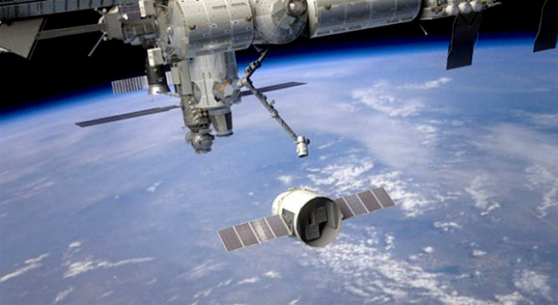
“Pods 1 and 4 now online and thrusters engaged. Dragon transitioned from free drift to active control. Yes!!!” said SpaceX founder Elon Musk in a tweet.
[aditude-amp id="flyingcarpet" targeting='{"env":"staging","page_type":"article","post_id":631504,"post_type":"story","post_chan":"none","tags":null,"ai":false,"category":"none","all_categories":"business,","session":"A"}']The SpaceX Falcon 9 rocket carrying the Dragon spacecraft lifted off at 10:10 a.m. Eastern from Cape Canaveral Air Force Station this morning. The launch was successful and NASA said the Falcon was “well on its way to the international space station.” At 10:56 a.m., SpaceX CEO Elon Musk tweeted that there was an “issue” with the Dragon’s thruster pods. Now, all of the four thruster pods are back online and engaged.
During a press conference held by SpaceX and NASA, Musk said the situation is under control and the Dragon could potentially arrive at the space station Sunday.
AI Weekly
The must-read newsletter for AI and Big Data industry written by Khari Johnson, Kyle Wiggers, and Seth Colaner.
Included with VentureBeat Insider and VentureBeat VIP memberships.
“We are really deeply engaged in trying to figure out what went wrong with the Dragon pressure system and trying to bring it back online,” Musk said. “Moments ago, we were able to bring pods one and four online and they appear to be working normally, which is great. Now trying to bring pods two and three online as well, and they are actually also looking quite good. We want to make sure have checked all parameters and things are looking good before turning them on. We are optimistic that we will be able to turn all four pods on and restore full control.”
While they have not yet figured out the root cause of the problem, the team said that the most likely culprit was a blockage in oxidizer pressurization that prevented the thruster pods from engaging.
“We saw that the oxidizer pressure in 3 of the 4 tanks was low, so we spent the last several hours trying to fix the problem and we think we have and if thats the case, it will certainly be a huge relief,” Musk said. “There is no leakage, no debris or fluid or gas leakage that we are aware of. All systems appear to be intact and functioning quite well at this point. Hopefully things keep going in this direction.”
Michael Suffredini, the program manager of the International Space Station, said that three of four pods are required to enter the “protected ellipsoid” around the space station. Once they convince themselves that the system will “remain healthy with redundancy,” they can prepare for the next “berthing opportunity.”
This is the fourth mission for the Dragon and the first in which a malfunction occurred. In May, the Dragon became the first commercial vehicle in history to successfully attach to the International Space Station.
VentureBeat's mission is to be a digital town square for technical decision-makers to gain knowledge about transformative enterprise technology and transact. Learn More
